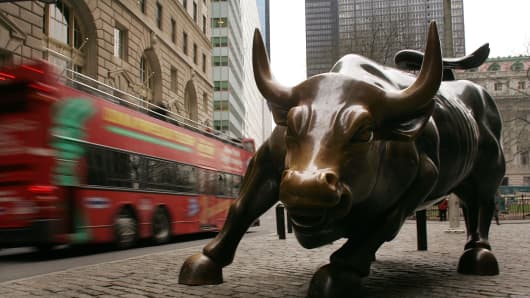"If next week improves our impression of current conditions from what we saw two weeks ago, I think the market continues to trend higher," said Art Hogan of Lazard Capital Markets. "If we have another March-like string of reports, then the market has probably gotten ahead of itself."
The Dow in the past week rose further into record territory, finishing at 15,118.49, up 0.97 percent for the week. The S&P 500 ended at 1,633.70. Both the Dow and S&P 500 closed at new highs. While stocks rose, so did bond yields. The 10-year note's yield rose about 16 basis points this week, the most on a weekly basis in two months.
Stocks gained new momentum after April's better-than-expected employment report showed the economy was not as sluggish as some had feared. The report, however, also painted a still-soft jobs picture, which should encourage the Fed to continue its easing programs, viewed as a positive for stocks.
(Read More: Dow, S&P Hit New Highs; Stocks End Up for Week)
Weekly jobless claims data have also been confirming the view that employment could be setting up to improve in the next couple of months. The four-week average of claims is now at the lowest level since November 2007.
The market has also seen a major sector rotation, and the stocks that have been leading the market higher this year have been lagging. Cyclical sectors, like industrials, materials and financials, have been seeing the best gains as investors bet on better economic growth.
"We've argued the market's been less about cyclical and defensive, which is the way it's been presented," said Tobias Levkovich, chief equity strategist at Citigroup.
"It's been a lot more about domestic and international. If you are a domestic cyclical—retailer, housing-related, shale gas-related, transportation or media company—these are heavy domestic businesses on the cyclical side, and they've done extremely well. They are outperforming. It's not just the consumer staples or biotech. The average tech stock has outperformed, by the way."
He said it's the international or global cyclicals that have suffered.
"Materials, the industrial names, like mining equipment, so the market's been fairly smart about it," he said. "If you're a domestic cyclical, you get rewarded, but if you're an international cyclical, and worried about China or Europe, you don't get rewarded."
(Read More: Rotation to Cyclicals Could Provide Further Market Boost)
Whither Stocks
Levkovich said there have been some positives lately for the market, including a clear improvement in credit conditions, apparent in the recent release of the Fed lending-standards survey.
"We are actually seeing reason to believe the economy will accelerate into the end of the year," he said. The survey, released Monday, showed that banks eased lending standards to U.S. businesses over the last three months as competition picked up and loan demand improved.
"All this is saying is it corroborates the strength in the market. There is a fundamental underpinning to what the Fed has done," Levkovich said.
He said it's not just about rates or the cost of money.
"There's also aspects to it that relate to how much capital you have to tie up," he said.
Levkovich said he's been watching the survey closely since 2007, when it began signaling trouble for credit markets. And while there is a nine-month lag in terms of activity, it also correlates to industrial production, which ties directly to corporate profits.
Another indicator Levkovich is watching is the VIX, which has been trading at about 13. Known as the fear gauge, Levkovich said he does not buy the view that it is a contrarian indicator for the market when it's below 20. The VIX reflects market expectations of near-term volatility and it is a metric of the out-of-the money puts and calls at the CBOE.
"When the VIX is between 10 and 15, most people would say the market is really complacent, or at risk. Eighty-five percent of the time when the VIX is between 10 and 15, the market was higher six months later, and it was up 12 months later, 88 percent of the time," he said.
Levkovich has a target of 1,615 on the S&P, and he has been expecting the index to surpass his year-end target before pulling back. But he is not a big supporter of the "sell in May" idea and says a more troublesome time for stocks could be in the fall, around September.
He said it may be that the Fed spooks markets by then, if an improving economy encourages Fed officials to discuss paring back on their easing program at their annual late August Jackson Hole symposium. He also said there could be new fiscal battles in Washington over the debt ceiling by then, that would trouble stocks. Europe also continues to hang over the market.
What to Watch (times in EDT)
Monday
8:30 a.m. retail sales
10 a.m. business inventories
Tuesday
7:30 a.m. National Federation of Independent Business survey
8:30 a.m. import prices
Wednesday
8:30 a.m. Producer Price Index
8:30 a.m. Empire State survey
9 a.m. Treasury International Capital data
9:15 a.m. industrial production
10 a.m. National Association of Home Builders survey
Thursday
8:30 a.m. initial jobless claims
8:30 a.m. Consumer Price Index
8:30 a.m. housing starts
10 a.m. Philadelphia Fed
12:30 p.m. Fed Gov. Sarah Raskin on economy
Friday
9:55 a.m. consumer sentiment
10 a.m. leading indicators



